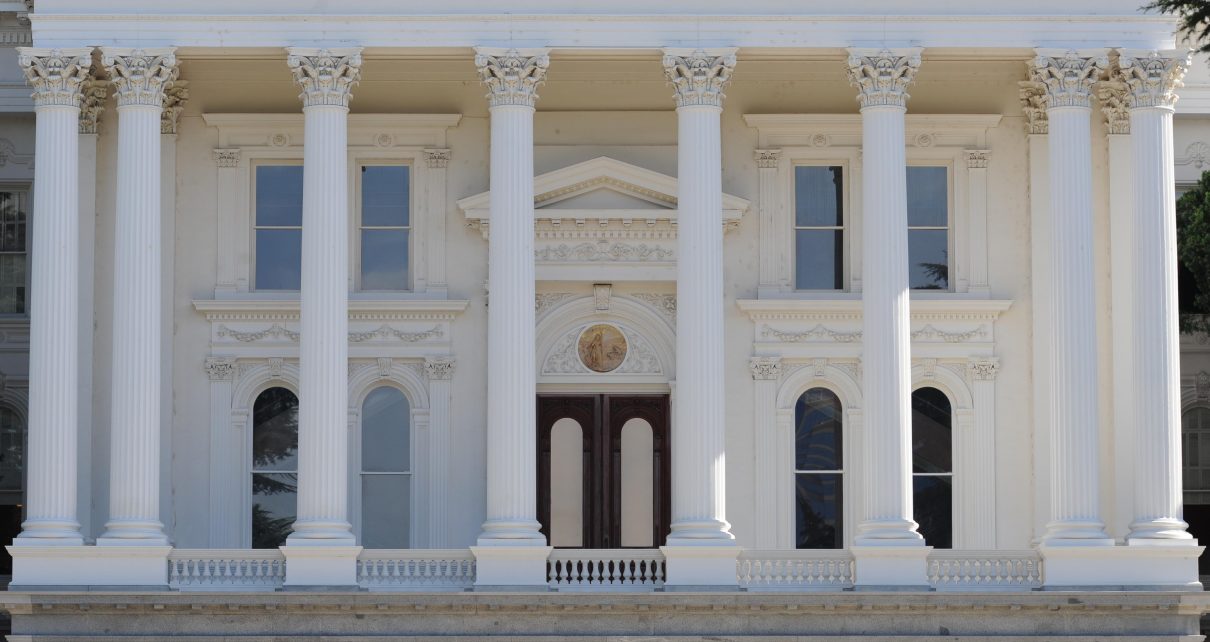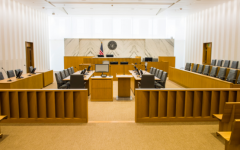
California State Capitol. (Photo: Kevin Sanders for California Globe)
California Civil Fees
Sets the uniform fee for filing the first paper in a limited civil case is $330
By Chris Micheli, November 16, 2024 2:32 am
Article 1 deals with civil fees generally. Section 70600 expresses legislative intent to establish a uniform schedule of filing fees and other civil fees for the superior courts throughout the state. This chapter may be called the Uniform Civil Fees and Standard Fee Schedule Act of 2005.
Section 70601 expresses legislative intent to establish a moratorium on increases in filing fees until January 1, 2008. No fee provided for in this chapter may be changed before January 1, 2008, except as may be required by specified legislative recommendations.
Section 70602.5 expresses the intent of the Legislature to supplement certain first paper filing fees as provided in this section.
Section 70602.6 provides a supplemental fee of $40 is to be collected for filing any first paper subject to the uniform fee that is set at $355.
Section 70603 specifies that the fees charged for filings and services under this chapter are intended to be uniform statewide and to be the only allowable fees for those services and filings. The only charges that may be added to the fees in this chapter are specified in this section.
Section 70611 provides the uniform fee for filing the first paper in a civil action or proceeding in the superior court, other than in a limited civil case, an adoption proceeding, a proceeding under the Probate Code, or a proceeding under the Family Code, is $355.
Section 70612 sets the uniform fee for filing the first paper in the action or proceeding on behalf of any defendant, intervenor, respondent, or adverse party, whether separately or jointly, except for the purpose of making disclaimer, is $355. The term “paper” is defined.
Section 70613 sets the uniform fee for filing the first paper in a limited civil case is $330.
Section 70613.5 provides that, if a plaintiff or petitioner who previously was charged the filing fee and files an amended complaint or other initial pleading that increases the amount demanded to an amount that $10,000, but does not exceed $25,000, so that the higher filing fee would have been required if such a demand had been made in the original pleading, a fee equal to the difference between the fee for the original filing fee and the filing fee for the new amount demanded are to be charged to make up the difference between the filing fees. This fee is distributed to the Trial Court Trust Fund.
Section 70613 sets the uniform fee for filing the first paper in a limited civil case on behalf of any party other than a plaintiff is $330.
Section 70615 sets the fee for filing any of the specified appeals to the superior court is $25.
Section 70616 specifies that a single complex case fee is to be paid to the clerk on behalf of all plaintiffs, whether filing separately or jointly, either at the time of the filing of the first paper if the case is designated as complex pursuant to the California Rules of Court, or, if no such designation was made, in each case in which a court determines that the case is a complex case pursuant to the California Rules of Court, within 10 calendar days of the filing of the court’s order.
Section 70616.5 states that a single high-frequency litigant fee is to be paid to the clerk on behalf of a plaintiff who is a high-frequency litigant at the time of the filing of the first paper if the complaint alleges a construction-related accessibility claim. The fee established by this section is $1,000.
Section 70617 provides the uniform fee for filing a motion, application, or any other paper requiring a hearing subsequent to the first paper, is $60.
Section 70618 states that, when the venue in a case is changed, the fee for making up and transmitting the transcript and papers is $50 and a further sum equal to the uniform fee for filing in the court to which the case is transferred. The clerk must transmit the uniform filing fee with the papers in the case to the clerk or judge of the court to which the case is transferred.
Section 70619 specifies the fee for reclassification of a case from a limited civil case to an unlimited civil case is $140.
Section 70620 states the fee for a certificate required by courts of appeal or the Supreme Court on filing a notice of motion prior to the filing of the record on appeal in the reviewing court is $20.
Section 70621 specifies the fee for filing a notice of appeal to the appellate division of the superior court in a limited civil case is $330.
Section 70622 provides that, after giving notice and holding a public hearing on the proposal, the Board of Supervisors of Riverside County may impose a surcharge not to exceed $50 for the filing in superior court of five specified documents.
Section 70624 provides that, after giving notice and holding a public hearing on the proposal, the Board of Supervisors of San Bernardino County may impose a surcharge not to exceed $35 for the filing in superior court of specified documents. This section is in effect until January 1, 2026.
Section 70625 states that, for the purpose of assisting the City and County of San Francisco in the acquisition, rehabilitation, construction, and financing of courtrooms or of a courtroom building or buildings containing facilities necessary or incidental to the operation of the justice system, the Board of Supervisors of the City and County of San Francisco may require the amounts collected to be deposited in the Courthouse Construction Fund.
Section 70626 established a fee of $40 for eight types of specified services and the amounts collected are to be distributed to the Trial Court Trust Fund. There is also a fee of $45 for nine specified documents.
Section 70627 specifies fees collected under this section are distributed to the court in which they were collected. The clerk of the court charges fifty cents per page to cover the cost of preparing copies of any record, proceeding, or paper on file in the clerk’s office. For comparing with originals on file, the copy fee is $1 per page. And, the fee for a search of records or files conducted by a court employee that requires more than 10 minutes is $15 for each search.
Section 70628 specifies that, for an exemplification of a record or other paper on file, the fee is $50, in addition to the charges allowed for copying or comparing each page of the record or other paper.
Section 70629 requires the clerk of the court to collect a fee of $15 per signature for any document that is required to be authenticated pursuant to court order. For each document that is authenticated by the clerk of the court, it must contain the following statement: “____, Clerk of the Superior Court, County of ____, State of California. Signed pursuant to court order dated ____ in the matter of ____ petitioner v. ____, respondent, Case No. ____.”
Section 70630 requires the court clerk, if the court has made videoconferencing services available, to charge a reasonable fee to cover the costs of permitting parties to appear by videoconferencing. This fee is deposited into the Trial Court Trust Fund.
Section 70631 states that, in the absence of a statute or rule authorizing or prohibiting a fee by the superior court for a particular service or product, the court may charge a reasonable fee not to exceed the costs of providing the service or product, if the Judicial Council approves the fee. The fee is distributed to the court in which it was collected.
Section 70632 requires the clerk of the court to charge a reasonable fee for handling funds held in trust for non-court parties or entities. The amount of the fee for handling the funds is be based on rules adopted by, or guidelines and policies authorized by, the Judicial Council. This fee is deposited into the Trial Court Trust Fund.
Section 70633 prohibits a fee from being charged by the clerk for service rendered to the petitioner in any adoption proceeding or for any service to the state or for any proceeding brought to declare a minor free from parental custody or control. Also, a fee cannot be charged by the clerk for services rendered in an action to compel registration of a voter or to compel counting of provisional ballots.
In addition, a fee cannot be charged by the clerk for services rendered in any criminal action unless otherwise specifically authorized by law, with specified exceptions. If a criminal defendant has been granted a fee waiver or the court finds that the defendant does not have the ability to pay the fee, the court may reduce or waive the fee. Also, no fees are allowed for service to any local, state of federal governments or their officials.
Section 70635 prohibits a fee from being charged to the petitioner in a proceeding for a change of name that meets the conditions for the exemption if the action is filed on behalf of a minor. This section is known as “Sydney’s Law.”
Section 70640 provides that it is the policy of the state that each court shall endeavor to provide a children’s waiting room in each courthouse for children whose parents or guardians are attending a court hearing as a litigant, witness, or for other court purposes as determined by the court. To defray that expense, monthly allocations for children’s waiting rooms are added to the monthly apportionment for each court where a children’s waiting room has been established or where the court has elected to establish that service.
- Appeals in Judicial Proceedings - January 31, 2026
- Permissive Joinders in California - January 30, 2026
- Monetary Deposits in Court - January 30, 2026



